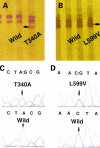The E-cadherin gene (CDH1) variants T340A and L599V in gastric and colorectal cancer patients in Korea
- PMID: 10896919
- PMCID: PMC1728009
- DOI: 10.1136/gut.47.2.262
The E-cadherin gene (CDH1) variants T340A and L599V in gastric and colorectal cancer patients in Korea
Abstract
Introduction: Germline mutations in E-cadherin (CDH1) have been reported in families with early onset, diffuse gastric cancer. More recently, mutations in CDH1 have been described in colorectal cancer cell lines.
Aims: We have investigated if germline mutations in CDH1 occur among different groups of Korean gastric and colorectal cancer patients, with and without a positive family history.
Methods: We studied 131 patients and 168 normal controls (88 Korean and 80 non-Korean). Patients were divided into five groups: group I, 20 gastric cancer patients with a family history; group II, 26 colorectal cancer patients with a family history of gastric cancer (those from familial adenomatous polyposis (FAP) and hereditary non-polyposis colorectal cancer (HNPCC) kindred were excluded); group III, 16 HNPCC patients without identified germline mutations in hMLH1 and hMSH2; group IV, 35 gastric cancer patients without a family history; and group V, 34 colorectal cancer patients without a family history. Polymerase chain reaction, single strand conformational polymorphism analysis, direct sequencing, and genotyping for identified variants were performed.
Results: Several germline changes in CDH1 were found. In addition to previously described polymorphisms, we found three novel changes, two of which were missense changes (T340A and L599V). T340A was present in one patient in group III and one in group V. L599V was present in one patient in group II, in two in group III, and in one in group IV. T340A was not found in normal controls while L599V was present in two of 88 Korean controls. Patients with these variants may appear to have a tendency to early onset cancer with a positive family history, although differences in frequencies did not reach statistical significance. Genotyping results suggest that these variants might have a common origin, particularly T340A.
Conclusion: We have described two new missense germline variants in CDH1 in various groups of Korean gastrointestinal cancer patients. Further work is required to assess if these variants increase the risk of gastrointestinal cancer.
Figures

References
MeSH terms
Substances
LinkOut - more resources
Full Text Sources
Medical
Molecular Biology Databases
Miscellaneous
